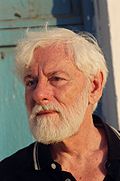From Gush Shalom

Henry Kissinger
(Image by (From Wikimedia) David Shankbone (1974–) / David Shankbone, Author: See Source) Details Source DMCA
I AM writing this (may God forgive me) on Yom Kippur. Exactly 43 years ago, at this exact moment, the sirens sounded.
We were sitting in the living room, looking out on one of Tel Aviv's main streets. The city was completely silent. No cars. No traffic of any kind. A few children were riding about on their bicycles, which is allowed on Yom Kippur, Judaism's holiest day. Just like now.
Rachel, my wife, I, and our guest, Professor Hans Kreitler, were in deep conversation. The professor, a renowned psychologist, was living nearby, so he could come on foot.
And then the silence was pierced by a siren. For a moment we thought that it was a mistake, but then it was joined by another and another. We went to the window and saw a commotion. The street, that had been totally empty a few minutes before, began to fill up with vehicles, military and civilian.
And then the radio, which had been silent for Yom Kippur, came on. War had broken out.
A FEW days ago I was asked if I was prepared to talk on TV about the role of Henry Kissinger in this war. I agreed, but at the last moment the program was canceled, because the station had to devote the time to showing Jews asking God for forgiveness at the Western Wall (alias the Wailing Wall). In these Netanyahu times, God, of course, comes first.
So, instead of talking on TV, I shall write down my thoughts on the subject here.
Henry Kissinger has always intrigued me. Once my friend Yael, the daughter of Moshe Dayan, took me -- in the great man's absence, of course, since he was my enemy -- to his large collection of unread books and asked me to choose a book as a present. I chose a book of Kissinger's, and was much impressed by it.
Like Shimon Peres and I, Kissinger was born in 1923. He was a few months older than the other two of us. His family left Nazi Germany five years later than I and went to the US, via England. We both had to start working very early, but he went on with his studies and became a professor, while poor me never finished elementary school.
I was impressed by the wisdom of his books. He approached history without sentiment and dwelled especially on the Congress of Vienna, after Napoleon's downfall, in which a group of wise statesmen laid the groundwork for a stable, absolutist Europe. Kissinger stressed the importance of their decision to invite the representative of vanquished France (Talleyrand). They realized that France must be part of the new system. To ensure peace, they believed, no one should be left out of the new system.
Unfortunately, Kissinger in power disregarded this wisdom of Kissinger the Professor. He left the Palestinians out.
THE SUBJECT I was to speak about on TV was a question that has intrigued and troubled Israeli historians since that fateful Yom Kippur: Did Kissinger know about the impending Egyptian-Syrian attack? Did he deliberately abstain from warning Israel, because of his own nefarious designs?
After the war, Israel was rent asunder by one question: why had our government, led by Prime Minister Golda Meir and Defense Minister Moshe Dayan, disregarded all the signs of the coming attack? Why had they not called up the army reserves in time? Why had they not sent the tanks to our strongholds along the Suez Canal?
When the Egyptians attacked, the line was thinly held by second-class troops. Most soldiers were sent home for the high religious holiday. The line was easily overrun.
Israeli intelligence knew of course of the massive movement of Egyptian units towards the canal. They disregarded it as an empty maneuver to frighten Israel.
(Note: You can view every article as one long page if you sign up as an Advocate Member, or higher).





